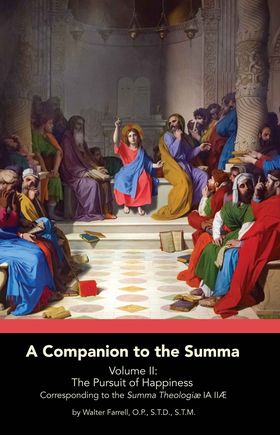Categories
Information
Fr. Walter Farrell, O. P. - Hardcover 412 pages
Order the 4 volume set here!
Volume Two
There is a need felt by those who, having heard enough of St. Thomas to whet their appetite, suddenly discover that they cannot go directly to St. Thomas without the guidance of a professor; and for most of them the leisure days of the classroom are over forever.
This, then, is the double purpose of this book: to furnish a rational defense of his faith for the ordinary Catholic and to open St. Thomas to the layman who has no professional philosophical or theological knowledge. It is not, then, intended only for the very learned, nor for a textbook. If it must be described in a phrase, it might best be called an easy guidebook to St. Thomas’s greatest work.
Just as a guidebook to Paris can be best evaluated in the streets of Paris, so this guide book to the Summa can be best appreciated in the pages of the Summa, by comparing the individual chapters of the book with the corresponding questions of the Prima Secundae (First Part of the Second Part) of St. Thomas’ Summa, questions that are given at the head of each chapter. Any particularly striking point will be found more fully and more beautifully developed in the Summa itself; further proofs, explanations, and illustrations can all be had directly from St. Thomas.
It is important to remember that it is the Summa reduced to popular language and not merely another book about St. Thomas or about the Summa. In fact, it is often more than that, for, particularly on difficult questions, the parallel passages in other works of St. Thomas have been freely used where the conciseness of the Summa might have caused some obscurity for one not wholly familiar with the thought of Thomas.
Father Farrell’s four-part Companion to the Summa has been responsible for much of the renewed interest in Thomism in the United States. It is required reading for many Catholic college students and “unrequired reading” for thousands of other lovers of St. Thomas.
Its author was born in Chicago in 1902. He attended Dominican schools and was ordained in the Dominican order in 1927, then going to the University of Fribourg for his S.T.D. degree. In 1940 he was awarded the seldom given Dominican honor of the Master of Sacred Theology degree. He served as a Navy chaplain during World War II and was then stationed at the Dominican Houses of Studies in Washington, D. C. and River Forest, Illinois until his death in 1951.
A Word About Loreto Publications
All publishing houses have some overarching principles that guide the choice of which books they publish and promote (unless they be primarily interested in monetary gain, in which case they are of no account) and according to which they base their operations and choices.
Loreto’s foundation is based upon a specific set of Catholic principles and a school of thought that developed around a religious order founded in 1949 in Cambridge Massachusetts, the Slaves of the Immaculate Heart of Mary. At the heart of their spirituality lies two essential pursuits, the pursuit of wisdom as described by their philosopher Br. Francis Maluf, M.I.C.M. —“Wisdom is the most perfect knowledge of the most important truths in the right order of emphasis, accompanied by a total, permanent disposition to live accordingly.”—and a fervent desire to train up an army of apostles to convert our beloved nation to the Catholic religion.
The spiritual and intellectual life of these ardent Slaves developed by being steeped in the works of people such as Cornelius aLapidé, Dom Gueranger, St. John Eudes, St. Louis Marie deMontfort, Bl. Dom Marmion, St. Maximilian Kolbe, St. Alphonsus Maria deLiguori, and the Fathers and Doctors of the Church, especially St. John Chrysostom, St. Augustine, and St. Thomas Aquinas. Of course, their attachment and devotion to Our Lady of Fatima and the ancient and immemorial Roman liturgy is legendary.
For articles about the Summa and St. Thomas Aquinas, click here!



